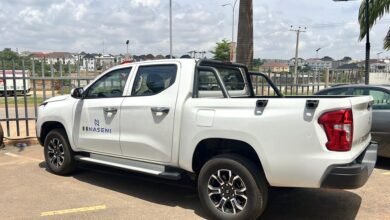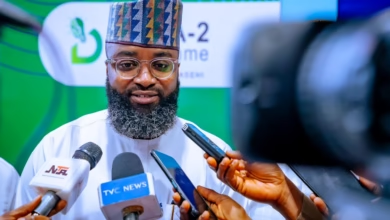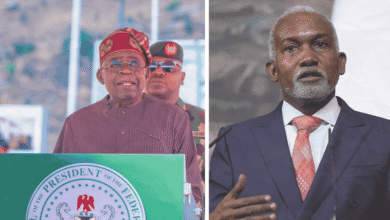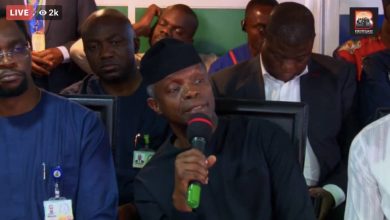Opinion
A Lagos Original – In Touch
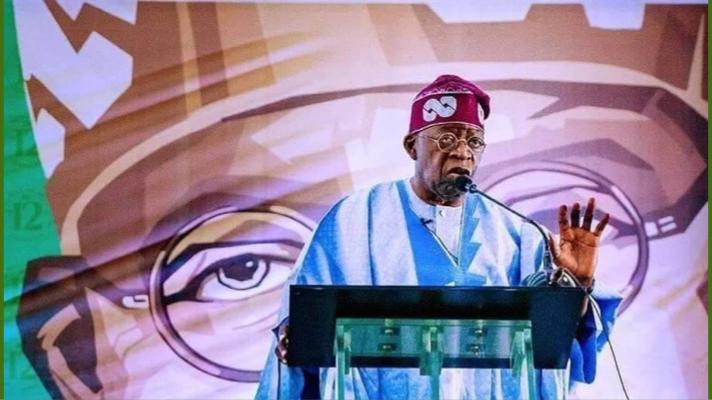
By Sam Omotseye
He is rich. He is powerful. He has influence. He has changed lives. He transformed a city. Made men and women. Yet he attracts quite a few adversaries. They deny him the right to be human. When he is sick, some wish him dead or eternally crippled. When he is not seen, some conjure his ghost as a dead soul. When he reappears, they won’t even credit him as a revenant, a man who came back from the dead. Rather, they wait for another date with the grave – in their imagination.
When he makes a mistake, they raise the stakes of sin and he becomes Satan. When he does a saintly thing, they turn either blind or amnesiac. When they are around him, they flatter and lick his boots. A minute after they leave his ken, they snarl and huff.
His traducers are like the characters in the proverb that says, “Haters don’t really hate you, they hate themselves because you are a reflection of what they want to be.”
Asiwaju Bola Ahmed Tinubu knows this. Hence, he has never had an enemy in politics. Rather he has rivals. He can joust, even if he may not be just. He has had many, some over money charges, often on matters where he is just. But he has never maligned nor spat malice. Hence when some of his associates left, he has often welcomed them back and elevated them, causing those who are at home to feel left behind. He has done it in public. Before him, Jesus had dispensed the parable of the prodigal son who overtook the homeboy. Tinubu has never abandoned a prodigal. He understands the human conscience, the tendency to fall and faint, and he is ready to embrace and give an opportunity for rebirth. I have seen a few bow before him for pardon after shooting him with bows and arrows.
Few in politics have this gift. They know it is one of his cardinal staying privileges and virtues. They hate him and try to tell a story of original lies about this Nigerian original.
They won’t tell the story that he was the one who fought for this democracy when they were galivanting with soldiers in the military era, when June 12 fumed. They hid in shadows and fear. They say he is rich, so he must be a crook. Yet he fought in the trenches home and abroad, sacrificing his personal treasures for some of those who now tar him with lies. I saw an article in ThisDay on Sunday refer to an episode when Nobel Laureate Wole Soyinka narrated how Tinubu begged the bard, because of his global credibility, to sign a paper for him to import Taiwan rice. The gifted writer obliged. He knew the value of the fruits to dethrone the dark-goggled brute in Aso Rock, and the soldiers paid him back in ruthless kind chasing after him in western countries. They forget he was rich before he reached the gubernatorial office.
It will make sense for them to know his many firsts in the republic, some in Nigerian history. The issue of power. They forget that the idea of tinkering with the electric power architecture, and challenging the monolithic hold of PHCN began under Tinubu when he rattled OBJ as president to free the stranglehold of ‘NEPA’ monopoly. It began with Halliburton, and it has set the dialogue in motion to challenge the constitution.
They forget that he is the first gubernatorial engineer of finance. Lagos could not pay its civil servants because they had gnomes on the pay roll. He combed out the lies in the accounts like lice infected hair. He saved the purse. From about N1 billion in internally generated revenue, he left office filling the coffers every month with about N9 billion. Lagos is richer than the next state in IGR by more than twice. Some states earn in one year today what Lagos clutches in one month.
When, a few months ago, the governors said they were sending their men to learn from the Lagos experiment in making money, they were giving a tribute to the genius that made it happen. They hate to go like mendicants to Abuja for bailouts. They want to be like Lagos. Yet, some of them curse their source of the blessings.
His detractors balk at his wealth. They forget that he is often called Robin Hood, the man who takes from the rich and gives to the poor. It derives from his worldview not only as a liberal spender but his background among the poor in Lagos. Segun Ayobolu reminded us in his column of the same attacks on Awo over Maroko lands. The great Nigerian was called thief. Awo said: “In Nigeria, if a poor man is fighting for the poor, they will claim he is only jealous of the rich and if a rich man is fighting for the poor, they will ask him to first of all go and commit economic suicide and join the poor before he can pursue their cause.” Is that why Jesus said the poor will always be with us?
Rauf Aregbesola once asserted that financial engineering was Asiwaju’s capital legacy as governor. He may be right. His thought was that the flow of funds engendered the transformational projects in the state. Money is also the mother’s milk of development. But that is only one perspective. He has a background in finance, and as internal auditor in Mobil he overhauled the purse of the oil mogul. For appreciation, they made him in charge of finances, and he became treasurer.
I would say his best gift is his imagination. The story of power is one. What of security? while the rest of the nation crawls in fear today, Lagos is a strong tower. He signposted an answer with a security trust fund that secured an architecture for peace. That arrangement has only grown stronger from one successor to another. This is the deadliest hour in the nation’s security. Lagos remains a city on the hill.
Some say his great gift was the fight for federalist causes for which he used now vice president to a head a team to fight a number of causes, including allocation of revenues for all states in the nation. Lagos has followed that step, especially when a lawyer, now Trojan of works, Babatunde Raji Fashola (SAN), succeeded him. The battle is still on the burner. The BOS of Lagos Babajide Sanwo-Olu and the uproarious Nyesom Wike took on the tax matter last year.
On social issues, he, a Muslim, gave public schools back to the missions. A visionary step that will continue to shield Lagos from the maelstrom of bigotry that obsesses other parts of the country. This essayist reminded the nation that Tinubu, a Muslim, unfurled the Christian tradition of new year service every January in Lagos. In an age when politicians fall into a straitjacket of zealotry, Tinubu is wearing a garment of peace.
Others say his best quality is as a leader of leaders. He has given quite of few talents for the country, and I need no roll call here.
Tinubu’s biography distinguishes between a leader and a manager. Some managers are great, but they can only accomplish set goals. A leader of this sort is a visionary, who turns ideas into a soup of charisma to stamp a profound, if revolutionary change on a generation. That was the difference between Awo and Akintola, between Mandela and Mbeki, Between Churchill and Macmillan, between Washington and Adams, etc. After Charles De Gaulle left office, one of his cabinet ministers said the “story of De Gaulle is in his legend.”
By declaring to run for president, Tinubu is offering himself as a Lagos original. If no one can deny that Lagos is the best–run state in the nation by a mile, then, no one should look askance at an opportunity to rewrite Nigeria on a national scale.

